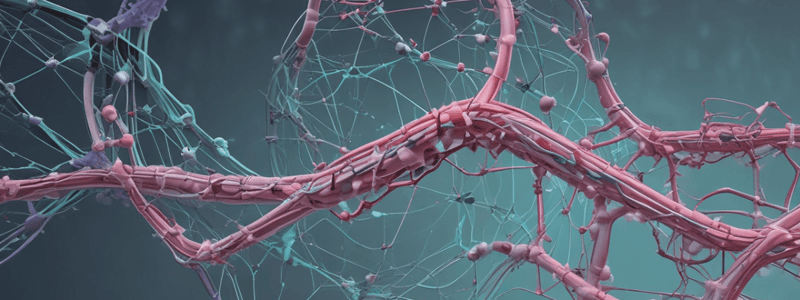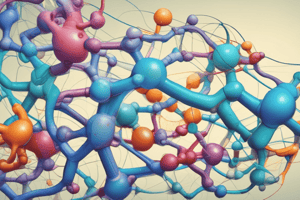Podcast
Questions and Answers
What is the primary function of glycine's non-polar nature in collagen?
What is the primary function of glycine's non-polar nature in collagen?
- To stabilize the collagen fibrils
- To create tight, compact structures (correct)
- To create a loose, flexible structure
- To facilitate the formation of alpha-helices
What type of bonds stabilize the triple helix of collagen?
What type of bonds stabilize the triple helix of collagen?
- Direct inter-chain hydrogen bonds and water-mediated hydrogen bonds (correct)
- Disulfide bonds
- Peptide bonds
- Hydrophobic interactions
What is the function of aldol cross-links in collagen?
What is the function of aldol cross-links in collagen?
- To facilitate the formation of beta-sheets
- To form the triple helix of collagen
- To covalently link tropocollagen molecules and create collagen fibrils (correct)
- To create a loose, flexible structure
What is the characteristic of motifs in globular tertiary structures?
What is the characteristic of motifs in globular tertiary structures?
What is the characteristic of domains in globular tertiary structures?
What is the characteristic of domains in globular tertiary structures?
What is the sequence of events in the formation of collagen fibrils?
What is the sequence of events in the formation of collagen fibrils?
What is the primary structure of a protein?
What is the primary structure of a protein?
What is the characteristic of an α-helix in a protein?
What is the characteristic of an α-helix in a protein?
Which of the following amino acids is a helix breaker in an α-helix?
Which of the following amino acids is a helix breaker in an α-helix?
What is the key feature of the hydrogen bonding in an α-helix?
What is the key feature of the hydrogen bonding in an α-helix?
What is the effect of small hydrophobic residues on α-helix stability?
What is the effect of small hydrophobic residues on α-helix stability?
Which of the following amino acids supports other conformations and is a helix breaker?
Which of the following amino acids supports other conformations and is a helix breaker?
What is the primary function of fibrous proteins?
What is the primary function of fibrous proteins?
Which type of protein has a more rigid and less flexible structure?
Which type of protein has a more rigid and less flexible structure?
What is the shape of fibrous proteins?
What is the shape of fibrous proteins?
What is the role of collagen in the body?
What is the role of collagen in the body?
Why does collagen have a glycine amino acid?
Why does collagen have a glycine amino acid?
What is the characteristic of a globular protein?
What is the characteristic of a globular protein?
What is the example of a globular protein?
What is the example of a globular protein?
What is the process by which a nascent protein can form into a toxic clump protein?
What is the process by which a nascent protein can form into a toxic clump protein?
Flashcards are hidden until you start studying
Study Notes
Protein Structure
- A nascent protein can form into either a properly folded protein with normal function or a toxic clump protein with no function.
- Protein misfolding occurs during co-translational and post-translational stages.
Fibrous Proteins
- Role: support, shape, and protection
- Characteristics: more rigid, less flexible than globular proteins, and single type of repeating secondary structure
- Shape: long strands and sheets
- Example: collagen, which provides structural support and is found in skin, tendons, ligaments, cartilage, bone, teeth, membranes, and blood vessels
Globular Proteins
- Role: catalysis and regulation
- Characteristics: compact shape and water soluble
- Example: carbonic anhydrase
Collagen
- Main fibrous protein in animals, provides structural support and stiffens with calcium
- Glycine is essential in collagen due to its non-polar nature and repetitive sequence, creating tight, compact structures that keep collagen in a fibrous shape
Primary Structure
- Primary structure refers to the linear amino acid sequence of the polypeptide chain
Secondary Structure
- Definition: local spatial arrangement of the polypeptide backbone
- Examples: α helix, β–pleated sheet
- α-helix characteristics: 3.6 amino acids per turn, right-handed helix, and the backbone C=O group of one residue is H-bonded to the –NH group of the residue four amino acids away
Factors Affecting α-Helix Stability
- Small hydrophobic residues are strong helix formers
- Proline is a helix breaker due to the impossibility of rotation around the N-Ca bond
- Glycine is a helix breaker due to its tiny R-Group supporting other conformations
Collagen Fibrils Formation
- Composition: three preprocollagen chains form a triple helix
- Stability: stabilized by direct inter-chain hydrogen bonds and water-mediated hydrogen bonds
- Formation process: procollagen → transformed into tropocollagen
- Tropocollagen linking: tropocollagen molecules are covalently linked via aldol cross-links to create collagen fibrils
Globular Tertiary Structures
- Motifs: small structures that include secondary structure elements like alpha helix and beta sheet, can exist as loops and barrel-like shapes
- Domains: larger structures that are part of a polypeptide chain, fold into specific shapes with specific functional roles
Studying That Suits You
Use AI to generate personalized quizzes and flashcards to suit your learning preferences.



